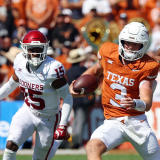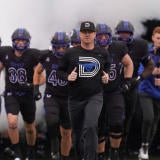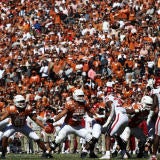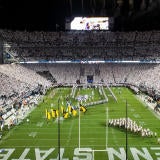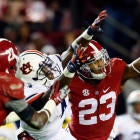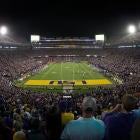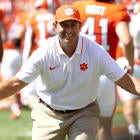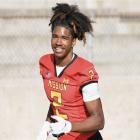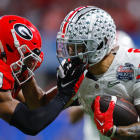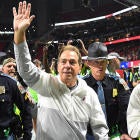Oklahoma's quarterback will be making close to $5 million this year. That's a fact, and perhaps a record for the Sooners' Kyler Murray. Somehow, the pillars of amateurism haven't collapsed just yet.
You know, the pillars that say money is the root of all evil in college athletics, unless it is being made by those who control college athletics.
The pillars that hold up the NCAA's amateur ideal. The disparate ideals that get a kid suspended taking a lunch from a booster, but allow that same millionaire to win a Heisman Trophy.
The pillars that prop up the NCAA's indefensible version of amateurism.
The irony of Murray being an amateur college quarterback and a professional baseball outfielder at the same time is rife with equal parts possibility and hypocrisy.
Murray was drafted ninth overall earlier this month by the Oakland Athletics. In the midst of competing for the starting quarterback job at Oklahoma, Murray signed his baseball contract on Friday. As a surprise top-10 pick, he will play one more season of college football before playing baseball for pay.
NCAA rules allow professionals in one sport to receive compensation while retaining college eligibility in another. Nothing new there except to question Oakland's wisdom in allowing its top pick to put his body and baseball career at risk for one more season under center.
The likes of John Elway and Russell Wilson have played pro baseball and college football at the same time, but perhaps never at this powerful of a program, at college football's most important position or for this much money.
Murray signed for a reported $4.7 million, took batting practice with the A's then declared, "Right now, it's about getting ready to go win a [football] national championship."
Just so as the Sooners know who's paying for the after party.
Whether Murray wins the starting job at Oklahoma is sort of irrelevant. It's what he represents. Whatever money he gets, he has earned. It's that his teammates pretty much can't (legally) earn a dime.
Aside from the head coaches and perhaps a coordinator or two, Murray will be the highest paid person on the field at his games this fall.
He will be a highly-compensated symbol for a system that has never been more under attack. How do you justify not paying players something further when a defensive coordinator (LSU's Dave Aranda) is making more than 80 head coaches ($2.5 million)?
How do you deny them something more when last year it was revealed the Big Ten commissioner is getting a $20 million bonus.
"The optics are what the writers make of them," Delany said smugly.
How is a scholarship enough when 29 NCAA football players have died -- mostly in workouts -- since 2000?
The walls are closing in on the NCAA. The administrators who continue to defend the system just have to know where they escape hatch is.
It's been less than four years since a district court judge found the NCAA was in violation of anti-trust laws in the landmark O'Bannon trial. It seems inevitable that sooner or later players are going to be able to earn something from their name, image and likeness.
The argument against is practically neanderthal. South Carolina president Harris Pastides testified in the O'Bannon case that payments "would create a wedge between those student athletes who receive the funds and those who don't."
In the same case, NCAA president Mark Emmert said payments would "certainly impact the way other student-athletes perceive them."
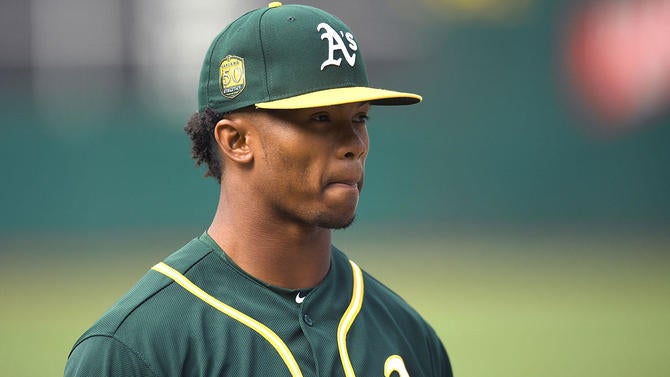
The suits seem to be actually suggesting that paying players would divide a locker room. How preposterous.
In the case of Oklahoma, Murray might be the best chance the Sooners have of returning to the College Football Playoff. That's not a locker room poison, that's hope for life after Baker Mayfield.
It has come to this: Murray's baseball salary allowed by the NCAA is literally the NCAA's argument for corruption.
"Google the NCAA's definition of amateurism," said Gerald Gurney, University of Oklahoma assistant professor and NCAA reformer. "Essentially it says athletes should not be paid because they need to concentrate on schoolwork. They can't juggle two balls at the same time. That's asinine and ridiculous."
At first, it might seem the root of this discussion is NCAA rules allow an athlete to turn pro in one sport and retain amateur eligibility in another.
But the real argument is how much the public and fans can stomach any college athlete being paid before they're not considered college (thus, amateur) athletes.
Apparently, quite a bit.
- Cost of attendance provides players between $5,000 and $10,000 per year just for being … athletes.
- Bowl gifts -- typically capped at $550 -- are nothing more than rewards for playing football. Men's and women's Final Four participants have their own gift suites to enjoy. Sports Business Daily reported basketball players who win their regular-season conference, conference tournament and NCAA Tournament could get $4,000 worth of gifts.
- All three military academies (Army, Navy, Air Force) routinely pay salaries to cadets in service to the country.
- Olympic stipends allowed by the NCAA range from the modest to the extravagant. Texas swimmer Joseph Schooling was paid $753,000 for his home country of Singapore for winning Olympic gold.
- Schools are allowed to pay five-figure insurance premiums of their NFL Draft prospects.
- One anonymous coach told me last year a player at his school could accumulate $96,000 legally over the course of his career.
Most of these are not benefits allowed to the normal student. Just don't ask the NCAA what a normal student is.
No one is going to deny that Murray deserves every penny he can get from the A's. It's only because he plays a different sport that he is not considered corrupted by NCAA standards.
"It's very confusing," Kyle Parker said.
Parker might be the best and most recent comparison to Murray. The former Clemson quarterback played football after getting a $1.4 million bonus with the Colorado Rockies in 2010.
After six years spent mostly in the minors, he returned to Clemson in 2017 to complete his degree.
"It's leaning more toward the athlete," Parker said, "but it's still completely lopsided how much money college athletes make and [how much schools] generate off of amateur [athletes]."
In a way, it's not a matter of paying players, it's about semantics. What one man calls improper compensation, another calls amateurism.
"I have no issue with Kyler Murray at all," Gurney said. "This is a demonstration of the NCAA's inconsistent and ridiculous definition of amateurism."
Parker said he was offered endorsements as a baseball player but couldn't accept them because he was still playing college football.
The same standard would apply to Murray.
"Any kind of advertising that you would have cashed in on playing in a big league city, you have to decline," Parker said.
More absurdity. As a football player, Murray cannot accept so much as a free burger from a booster. As a baseball player, he has enough money to buy his entire offensive line a steak dinner. I'm getting headaches just writing about it.
For 50 years, until 1956, the NCAA essentially banned players from getting anything in outside compensation.
Now? Some players are sending cash home because of the myriad ways they can get money.
Some of the progress is common sense. Some of it reflects increasing pressure from the courts. All of it is way overdue.
Big 12 commissioner Bob Bowlsby perhaps provided the most insight. He told the reform-minded Knight Commission college athletes are neither pros nor amateurs.
"I think it's a completely different genre of his own," Bowlsby said. "It doesn't exist anywhere else in the world …"
Maybe that's the biggest problem. Kyler Murray isn't the outlier. The system is.

